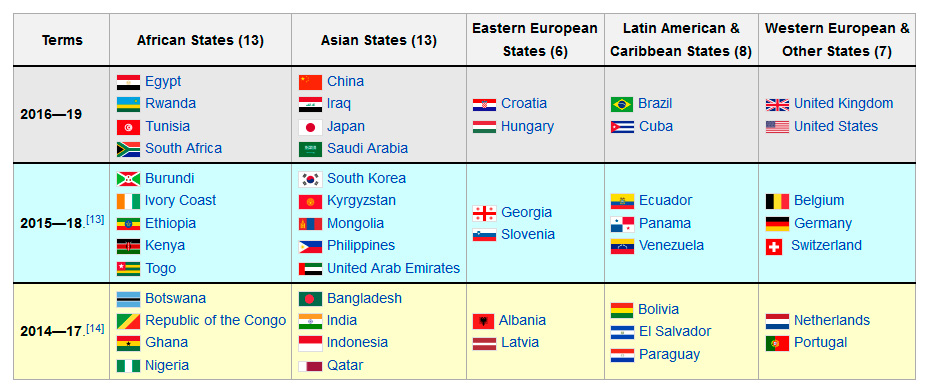For the first time in the 10-year history of the United Nations Human Rights Council the election of its members has caused somewhat of a stir. Russia did not receive the necessary number of votes to be elected to the Council. This is yet another blow to the reputation of the United Nations and calls into question the ability of a number of its members to make impartial decisions.
For the first time in the 10-year history of the United Nations Human Rights Council the election of its members has caused somewhat of a stir. In the run-up to the election, the Anglo-Saxon states put an unprecedented amount of pressure on the other UN members to ensure that Russia would not be re-elected to the Council. A number of human rights organizations were brought in to “sway” public opinion; they sent petition to the Human Rights Council demanding that Russia be excluded because of its actions in Syria. The freezing out of Russia is yet another blow to the reputation of the United Nations and calls into question the ability of a number of its members to make impartial decisions.
Three candidates from Eastern Europe were put forward for membership of the Human Rights Council in the period 2017–2019 at the meeting of the UN General Assembly held on October 28, 2016 – namely, Hungary, Russia and Croatia. According to the results, Russia received 112 votes, Croatia received 114, and Hungary received 144. The United States and the United Kingdom were given “free passes” to the Human Rights Council from a group of Western European and other states on a non-competitive basis. This speaks to the desire of Washington and London to seize the reins of power of one of the United Nation’s leading human rights bodies in order to promote their own politically motivated initiatives.
One such initiative was without a doubt the convening a week before the voting (on October 21) of the 25th Special Session of the Human Rights Council on the situation in Syria at the initiative of a group of states led by the United Kingdom. A despicably one-sided resolution was adopted as a result of the meeting, the goal of which is to place responsibility for what is happening in the eastern part of Aleppo squarely on the shoulders of the Syrian Army and its allies. The authors of the resolution refused to condemn the assistance that the terrorists inside Syria are receiving from the outside, recognize the need to separate the jihadists from the “moderate” opposition, and support the efforts of the UN Secretary-General’s Special Envoy for Syria Staffan de Mistura to expel the Jihadists and their allies from Eastern Aleppo. The resolution was supported by 24 states, with seven voting against and 16 abstaining. Accordingly, the number of states that did not support the resolution was almost exactly the same as the number of states that did. This is the evidence of the ongoing and significant divide in the conceptual understanding on the part of the member states of the purpose of the Human Rights Council. By ousting Russia from the Council, the Western countries are seeking to achieve a dominant and influential position in the Council and use it as an instrument to interfere in the internal affairs of “undesirable” states and undermine the fundamental principles of international law.
However, history shows that the attempts of certain countries to use UN agencies to implement their own geopolitical goals usually end in failure. It is due to this very kind of bias that the predecessor to the Human Rights Council, the UN Commission on Human Rights, sank ignominiously into oblivion.
It is telling that Washington held off joining the Human Rights Council for a long time, partly because of the new procedure that requires regular reviews of the extent to which states are fulfilling their human rights obligations. Washington was clearly irritated by the fact that others might be allowed to make an evaluation of its “exemplary” system. And these fears proved to be well founded. The results of the United States’ first comprehensive review were eye-opening. The UN member and observer states sent Washington a record 228 recommendations relating to the protection of human rights and how to eliminate human rights violations both inside the country and during military operations abroad. Particular attention was paid in the recommendations to the need to abolish the death penalty, shut down Guantanamo Bay detention camp, carry out a thorough investigation of cases of torture and abuse of power by the security forces, fight racial discrimination and intolerance, and respect the rights of migrants, minorities and indigenous peoples.
The second review, carried out in 2015, showed that the human rights situation in the United States had deteriorated. The methods used by the U.S. Special Services to collect personal information, including information from foreign countries, was condemned as illegal and a violation of basic human rights. It was stressed that Washington was in no hurry to sign major international treaties on human rights, including the Convention on the Rights of the Child, which has been ratified by every country in the world except the United States and Somalia.
In this regard, Russia could take advantage of the fact that it has been ousted from the Human Rights Council in the short term to circumvent the Council’s existing procedures, exposing Western “democracy” for what it truly is. Even now there is a noticeable increase in nationally oriented activities within the Council, which goes directly against the concept of comprehensive periodic review. And the plan of western countries to turn the Human Rights Council into a quasi-judicial monitoring mechanism and promote contradictory concepts such as the World Court of Human Rights Development Project is well known. It is not hard to guess that it will focus all its attention on states that the West finds undesirable.





